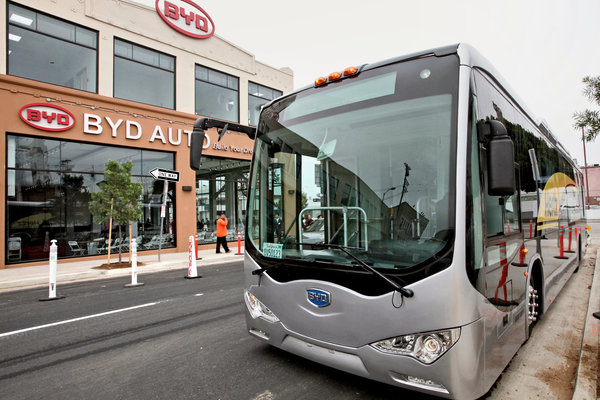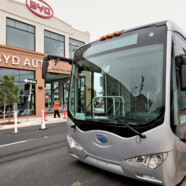Chinese Electric Bus Company Charges into US
In the heart of southern California, home of packed freeways and major smog problems, help may be on the way from an unexpected source – China. The Chinese company BYD is trying to make an impact while overcoming new obstacles.

BYD’s eBus, shown in Los Angeles, can run 155 miles on a charge and has led to contracts with transit agencies in Los Angeles and Long Beach.
Outside the BYD U.S. headquarters in the heart of Los Angeles, Auto Marketing Manager Lifang Yan agilely moved a 12-meter-long BYD electric-powered bus.
“Zero emissions, zero pollution, lower fuel costs, and lower maintenance costs,” she said.
BYD, which is short for “Build You Dreams”, is the first Chinese company to manufacture cars in the United States.
Its battery-powered buses should be a dream come true for a city with constant traffic jams and serious air pollution like Los Angeles. And so far, the company has three small orders from southern California transit agencies.
But now, it needs to convince buyers to make larger orders.
The Los Angeles County Transit Authority uses 2,200 propane-powered buses to transport 1.4 million people every day. Yet, it has also decided to invest in a small number of electric buses.
“Our goal is to have a cleaner environment. Our goal is to have a quieter environment,” said Richard Hunter, the transit authority’s head of bus procurement. “Our goal is to be very safe and have a pleasant passenger experience. These goals facilitate our investment into electric buses.”
However, Hunter said the initial order was only for five buses, with extensive testing over the next six to nine months.
The Federal Department of Transportation is also currently testing the performance of BYD’s electric buses to see if they meet U.S. standards.
Testing is not the only hurdle the company faces.
Lancaster Mayor R. Rex Parris lobbied BYD to build its factory in his town to bring jobs to the area.
But in October, a worker’s rights group reported the company for violating minimum wage standards – leading to a fine. An investigation later proved the accusation false and the fine was revoked. The company did pay a small fine for paying some its workers from Mainland China in Chinese currency.
And Mayor Parris came to its defense “You’re mixing two countries. You’re not just mixing two companies and I wasn’t really aware of that. You know, I was kind of expecting them to just be an American company with a Chinese name, you know. But that’s not how it works. But we were able to take care of it very quickly. You know, it turned out that it wasn’t really a problem and what adjustments needed to be made we made very quickly.”
The company said it would add up to 100 local workers this year as it looks to expand.

